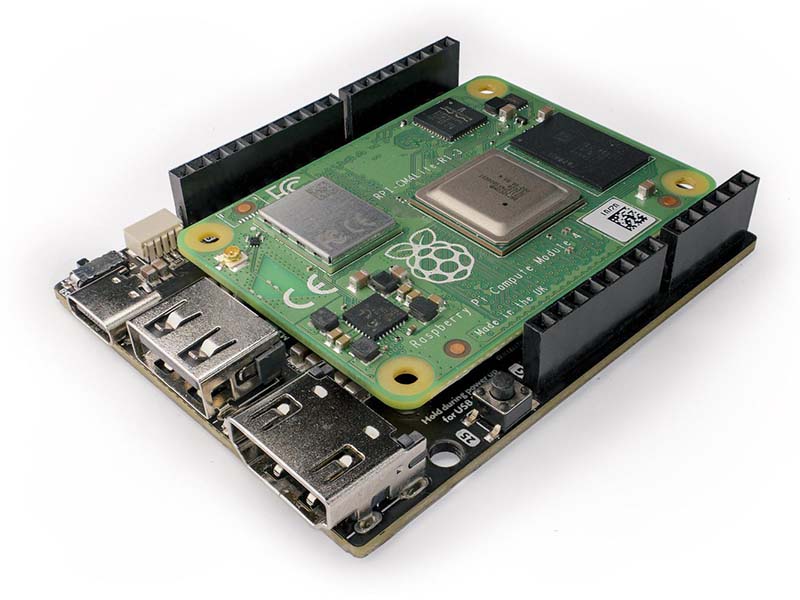
Piunora by Diodes Delight
Piunora is a compact, easy-to-use development board for electronics prototyping with Linux. It has a familiar form factor, legible pin labels, and a design that’s well suited to space-constrained applications.
As a carrier board for the Raspberry Pi Compute Module 4 (CM4), Piunora is essentially a tiny version of the Raspberry Pi 4 Single Board Computer (SBC) with added flexibility to accommodate custom form factors. CM4-based devices like Piunora are fully compatible with software that was written for the Raspberry Pi 4, as long as that software accounts for the hardware peripherals in use. There are also versions of the CM4 that include eMMC memory, which is more reliable than a traditional SD card.
It may be small, but Piunora is packed with powerful peripherals that will come in handy for rapid prototyping and embedded machine-learning applications. Examples include an HDMI port, camera-input connectors, and PCI-e support, which is not present on a standard Raspberry Pi 4. Finally, the M.2 B-Key port on the rear of the board is not only useful for SSD storage, it can also host a diverse range of PCI-e expansion boards.
Technical details
- Arduino UNO R3 / Adafruit Metro compatible form factor (3.3 V logic, may not be compatible with all Shields)
- PCI-e through M.2 B-Key connector on the rear of the board with dedicated 3.3 V/3 A supply
- Analog to Digital Converter (MCP3008)
- On-the-fly switching between USB host (USB Type-A) and device mode (USB-C)
- Qwiic/Stemma QT connector to easily interface with I2C devices
- A full-sized camera connector that supports all Pi-compatible cameras
- A full-sized HDMI 2.0 port
- A WS2812 Smart RGB LED for user status
- Optional Wi-Fi or eMMC options depending on your choice of CM4
- Slim design with the Piunora Lite measuring 8-12 mm and the Piunora Pro measuring 11-13 mm
- Two user-controllable buttons (including software that turns one of them into a safe-shutdown button)
Purchase
Contribute
Have some info to add for this board? Edit the source for this page here.
CircuitPython 10.1.3
This is the latest stable release of CircuitPython that will work with the Piunora. Use this release if you are new to CircuitPython.
Modules included in this download
_asyncio _bleio _bleio (HCI co-processor) _pixelmap adafruit_bus_device adafruit_pixelbuf aesio array atexit binascii bitbangio bitmapfilter bitmaptools board builtins builtins.pow3 busdisplay busio busio.SPI busio.UART codeop collections digitalio displayio epaperdisplay errno fontio fourwire framebufferio getpass gifio i2cdisplaybus io jpegio json keypad keypad.KeyMatrix keypad.Keys keypad.ShiftRegisterKeys keypad_demux keypad_demux.DemuxKeyMatrix locale lvfontio math microcontroller msgpack neopixel_write onewireio os os.getenv rainbowio random re rtc sdcardio sdioio select sharpdisplay storage struct supervisor sys terminalio tilepalettemapper time touchio traceback ulab usb_cdc usb_hid usb_midi vectorio videocore warnings zlibFeatures: Wi-Fi, Bluetooth/BTLE, STEMMA QT/QWIIC, Arduino Shield Compatible, USB-C
CircuitPython 10.2.0-alpha.1
This is the latest development release of CircuitPython that will work with the Piunora.
Alpha development releases are early releases. They are unfinished, are likely to have bugs, and the features they provide may change. Beta releases may have some bugs and unfinished features, but should be suitable for many uses. A Release Candidate (rc) release is considered done and will become the next stable release, assuming no further issues are found.
Please try alpha, beta, and rc releases if you are able. Your testing is invaluable: it helps us uncover and find issues quickly.
Release Notes for 10.2.0-alpha.1
Modules included in this download
_asyncio _bleio _bleio (HCI co-processor) _pixelmap adafruit_bus_device adafruit_pixelbuf aesio array atexit binascii bitbangio bitmapfilter bitmaptools board builtins builtins.pow3 busdisplay busio busio.SPI busio.UART codeop collections digitalio displayio epaperdisplay errno fontio fourwire framebufferio getpass gifio i2cdisplaybus io jpegio json keypad keypad.KeyMatrix keypad.Keys keypad.ShiftRegisterKeys keypad_demux keypad_demux.DemuxKeyMatrix locale lvfontio math microcontroller msgpack neopixel_write onewireio os os.getenv rainbowio random re rtc sdcardio sdioio select sharpdisplay storage struct supervisor supervisor.get_setting sys terminalio tilepalettemapper time touchio traceback ulab usb_cdc usb_hid usb_midi vectorio videocore warnings zlibFeatures: Wi-Fi, Bluetooth/BTLE, STEMMA QT/QWIIC, Arduino Shield Compatible, USB-C
Absolute Newest
Every time we commit new code to CircuitPython we automatically build binaries for each board and language. The binaries are stored on Amazon S3, organized by board, and then by language. These releases are even newer than the development release listed above. Try them if you want the absolute latest and are feeling daring or want to see if a problem has been fixed.
Previous Versions of CircuitPython
All previous releases of CircuitPython are available for download from Amazon S3 through the button below. For very old releases, look in the OLD/ folder for each board. Release notes for each release are available at GitHub button below.
Older releases are useful for testing if you something appears to be broken in a newer release but used to work, or if you have older code that depends on features only available in an older release. Otherwise we recommend using the latest stable release.
